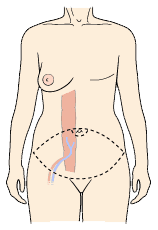Cytori Celution Improves Soft Tissue Transplantation
A lumpectomy is less drastic than having a mastectomy, but it leaves you with a scar and a dimple where a smooth, full curve used to be. The breast can also end up much smaller causing significant breast asymmetry in some women. This asymmetry is often exacerbated by the contraction (shrinkage) caused by the radiation therapy that usually follows lumpectomy.
An investigational breast reconstruction technique is being studied that uses your own fat and stem cells to repair the shape of your breast. This technique is called Cell-Enhanced Reconstruction, and was presented at the 2007 San Antonio Breast Cancer Symposium.
A Technique for Partial Breast Reconstruction
Women who have had breast-conserving surgery (lumpectomy, partial mastectomy) currently do not have any options for breast reconstruction. Mastectomy patients can choose from implants and tissue flap procedures for recreating a lost breast, but lumpectomy patients have been left behind – until now.
Japanese Investigational Study
Dr. Keizo Sugimachi, of Kyushu Central Hospital in Fukuoka, Japan, has used this new fat graft procedure on 21 patients, 79 % of which said they were pleased with the results. His colleague, Dr. Kitamura, who led the Japanese study, said, “The investigational procedure offers hope to partial-mastectomy patients who have limited options,” said Dr. Kitamura. “Unfortunately the concept of ‘breast conserving therapy’ can often times be misleading, as even minimally invasive resections can result in defects that leave patients dissatisfied with the cosmetic outcome.”
Stem Cell Enhanced Breast Reconstruction
Cell-enhanced reconstruction uses your own fat tissue (adipose) that is a rich source of stem and regenerative cells. These stem cells are not the controversial embryonic stem cells. Soft tissue transplants have been done for many years, but this new procedure uses a special process to ensure that the transplanted cells will live and adapt to the transplantation site. The process was developed by Cytori, and uses a machine called CelutionTM System EU.
Stem and Fat Cell Liposuction and Injection
Cytori Celution System is used to remove fat and stem cells. These cells are processed to create a mixture of concentrated stem cells combined with fat cells. This concentrated mixture is injected into your lumpectomy area in 3 places, to fill out the missing tissue. Your breast won’t immediately look like it has been repaired; it will need about a month for the transplanted cells to settle into position and fill out the lumpectomy cavity.
The Reconstruction Technique:
1: Standard liposuction removes fat, regenerative, and stem cells from abdomen
2: Cells go into the Cytori Celution processing system
3: Celution system separates regenerative and stem cells from fat cells. The regenerative and stem cells are
then washed and concentrated
4: The concentrated stem cell mixture is combined with the fat cells
5: The final mixture is injected into the lumpectomy area, where it fills in and replaces tissue volume.
One Surgical Procedure
Fat cells (adipose tissue) can be extracted from your abdomen, thighs, hips, or lower back. Only one surgical procedure is required for this breast reconstruction technique. In the Japanese study, patients were followed for up to 18 months after the procedure, with no loss of tissue volume and no recurrence of breast cancer.
Planned Clinical Studies
Women who participate in a clinical trial of cell-enhanced reconstruction must be recovered from their breast conservation surgery and any follow-up treatments, and must be recurrence-free for at least two years. There will be two clinical trials in Europe during 2008, which will involve about 90 patients. If approved, clinical studies will begin in the United States after 2008.
An investigational breast reconstruction technique is being studied that uses your own fat and stem cells to repair the shape of your breast. This technique is called Cell-Enhanced Reconstruction, and was presented at the 2007 San Antonio Breast Cancer Symposium.
Leave Comment
Sign Up for Our Monthly Newsletter
Related News & Press

Fat-Derived Stem Cell Enhanced Breast Reconstruction for Lumpectomy Repair
Breast Reconstruction Advances Fix Distortions Left by Lumpectomy Share on Facebook Twitter Linkedin Are there breast reconstruction options to fix Lumpectomy defects? ASPS Report Examines Reconstruction Innovations for Breast Cancer Patients Including Partial and Full Mastectomies For Immediate Release: April 2008 ARLINGTON HEIGHTS, Ill.: Lumpectomy or breast conservation surgery is the most common type of […]

Breast Reconstruction Advances Fix Distortions Left by Lumpectomy
Breast Reconstruction Advances Fix Distortions Left by Lumpectomy Share on Facebook Twitter Linkedin Are there breast reconstruction options to fix Lumpectomy defects? ASPS Report Examines Reconstruction Innovations for Breast Cancer Patients Including Partial and Full Mastectomies For Immediate Release: April 2008 ARLINGTON HEIGHTS, Ill.: Lumpectomy or breast conservation surgery is the most common type of […]

DIEP Flap Reconstruction And Breast Cancer Recurrence
DIEP Flap Reconstruction And Breast Cancer Recurrence Share on Facebook Twitter Linkedin Can DIEP flap breast reconstruction prevent the detection of breast cancer recurrence? This is a very important issue that is often not discussed. A handful of studies have shown that breast reconstruction (with any reconstructive technique) does not impact local recurrence or long […]

Breast Reconstruction Often Not Discussed
Breast Reconstruction Often Not Discussed Share on Facebook Twitter Linkedin Women with breast cancer faced with treatment decisions are often not told by their surgeons about the possibility of breast reconstruction after a mastectomy, a study confirms. When these conversations do occur, many more women choose mastectomy, researchers found. In a survey of 1,178 women […]

Few Women Have Regrets When Choosing Preventive Mastectomy for Other Breast
Few Women Have Regrets When Choosing Preventive Mastectomy for Other Breast Share on Facebook Twitter Linkedin Should you have a preventative mastectomy on the non-affected breast to reduce your risk of breast cancer? Is this for me? If you have been diagnosed with breast cancer in one breast and are considering having the other breast […]

DIEP Flap Surgery And How To Find A DIEP Surgeon
DIEP Flap Surgery And How To Find A DIEP Surgeon Share on Facebook Twitter Linkedin How can I find a DIEP flap breast reconstruction surgeon? Meet PRMA’s award winning DIEP flap surgeons DIEP flap surgery – so why all the hype? If you are a woman facing mastectomy due to breast cancer, one of the decisions […]
Breast Reconstruction Message Boards, Groups & Forums
Breast Reconstruction Message Boards, Groups & Forums June 15, 2020 Share on Facebook Twitter Linkedin Heading2 sed ut perspiciatis unde omnis iste natus Far far away, behind the word mountains, far from the countries Vokalia. Far far away, behind the word mountains, far from the countries Vokalia. Far far away, behind the word mountains, far […]


No Comments